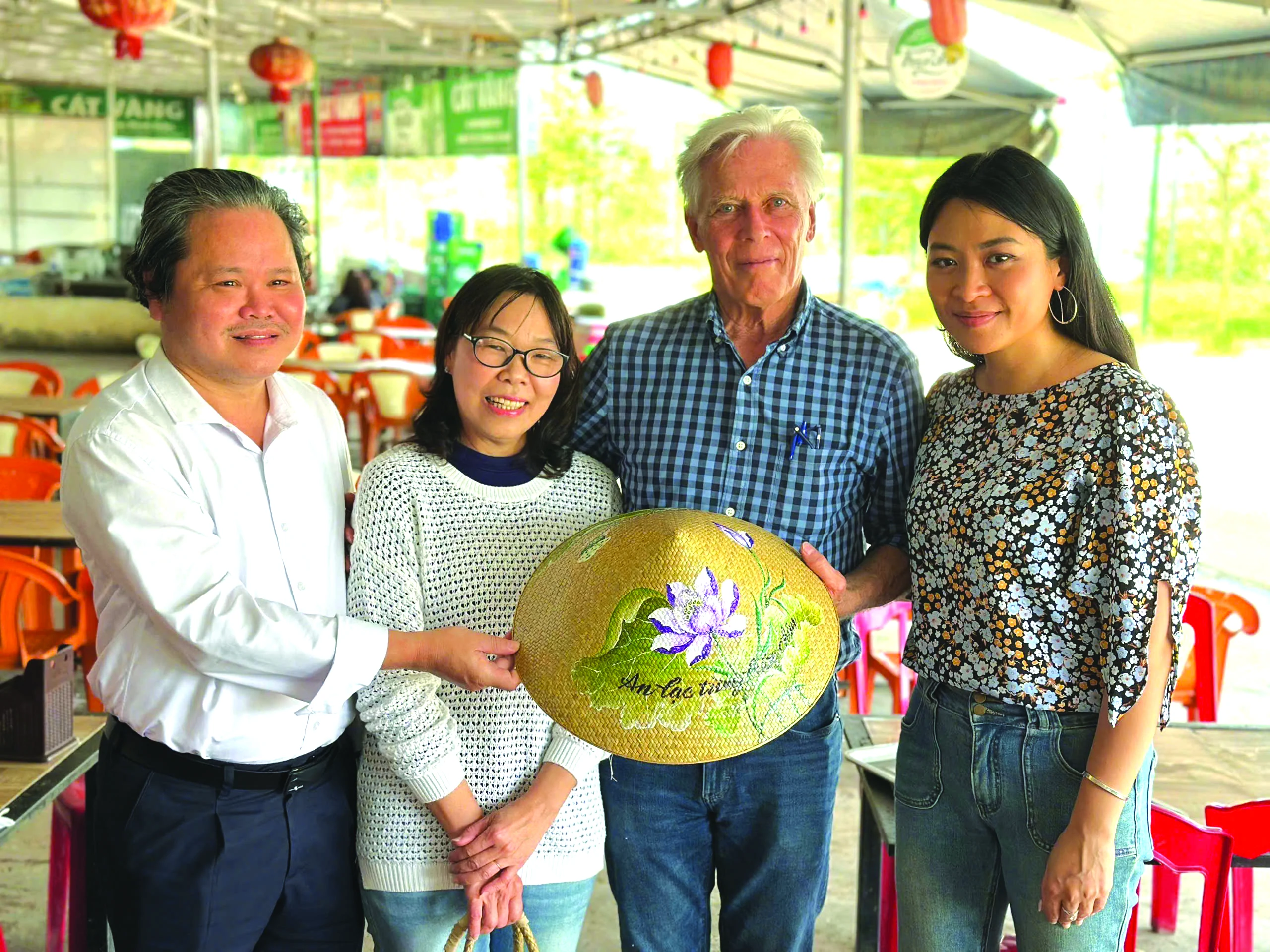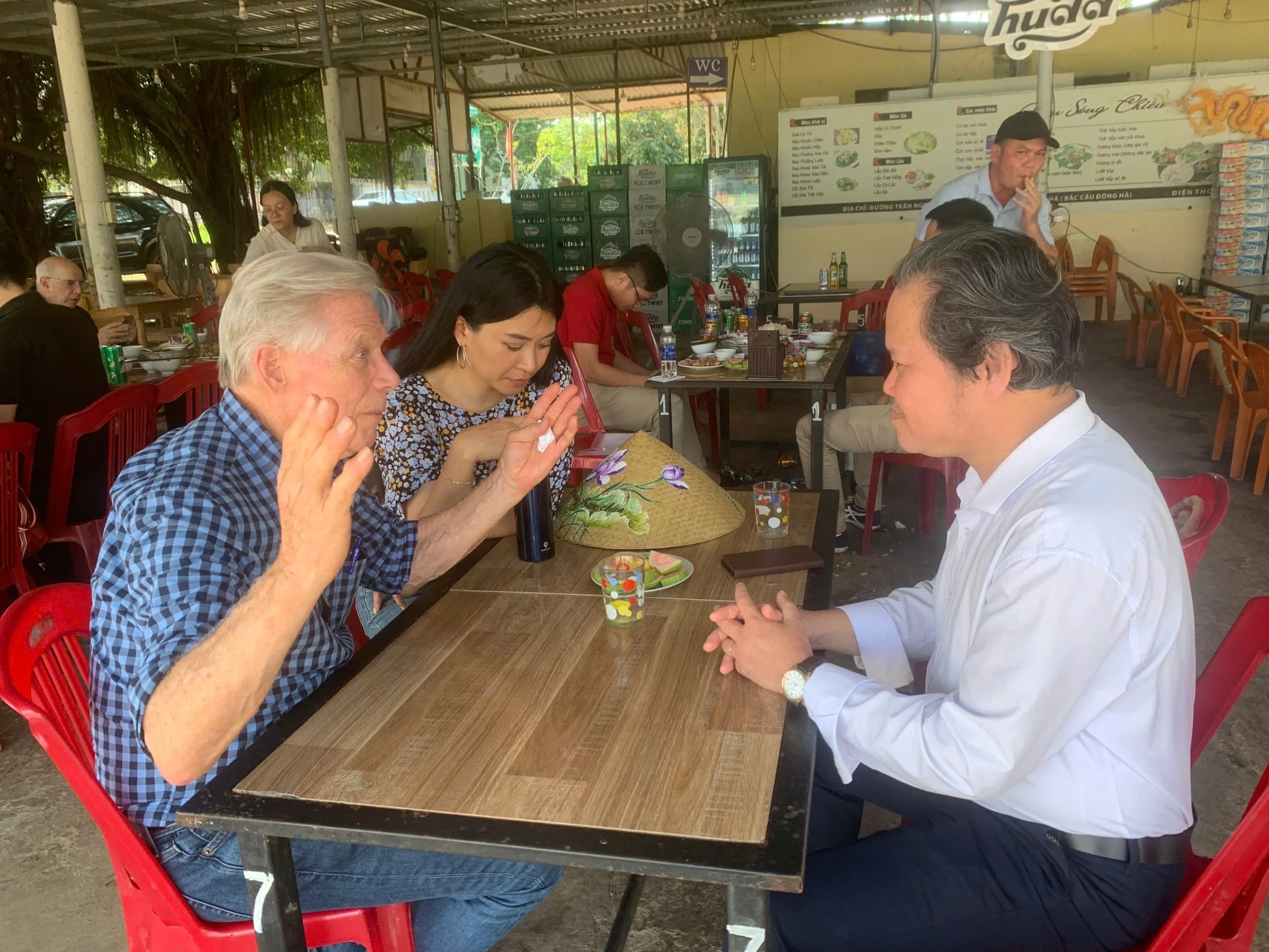{title}
{publish}
{head}
News of Craig McNamara, son of US Secretary of Defense Robert S. McNamara, visiting Vietnam, including Quang Tri, to participate in a film project at the request of the External Television Department (VTV4) of Vietnam Television, piqued my interest and kept me eagerly anticipating our meeting.
 Reporter Nguyen Hoan and his wife present a Vietnamese conical hat to Mr, Craig Mc Namara.
Reporter Nguyen Hoan and his wife present a Vietnamese conical hat to Mr, Craig Mc Namara.
I spent the entire afternoon unable to sleep in anticipation. The film currently being produced by VTV4 is a special documentary titled Cuoc do suc cua y chi (The Struggle of Will), highlighting the unique value and significance of Vietnam's military art during the war against the US and analyzing the mistakes made by the US in the war in Vietnam. The film crew's schedule was tight, with little free time, so I had to find a way to "insert" myself into the process to meet this special individual.
The meeting time kept shifting. I contacted them at 11 a.m., then 12 p.m., and finally at 1 p.m. My phone rang, and a reporter from the crew cheerfully said, "We’ve just finished the morning shoot and are now having lunch at the Song Chieu Restaurant. You can come now."
I quickly drove there with my wife. Before we left, I asked her to bring along a Vietnamese conical hat with a green lotus leaf design and a purple lotus flower, painted by her. The hat also featured the phrase “An lạc từng bước chân” (Peace with every step), inspired by Buddhist teachings and a wish for peace, which I intended to give to Craig McNamara.
At the Song Chieu Restaurant, known for its buffalo meat dishes, we found a refreshing, tranquil space by the clear Hieu River. The crew was having lunch, relaxed and enjoying themselves, seemingly forgetting the exhaustion from their travels. After lunch, my wife and I presented Craig McNamara with the Vietnamese conical hat and chatted with him. Though I had never met him before, I felt like I already knew him through the information highway.
His father, Robert S. McNamara, after nearly 30 years of silence following his departure from the Pentagon, wrote the book In Retrospect: The Tragedy and Lessons of Vietnam (published in Hanoi by the National Political Publishing House in 1995). In it, he acknowledged: "We, in the Kennedy and Johnson administrations, were involved in decisions regarding Vietnam... But we were wrong, terribly wrong."
While US Secretary of Defense Robert S. McNamara refrained from delving into the "profound impacts" of the war in Vietnam on his family, his son, Craig McNamara, took a deep, analytical approach to unpacking these effects in his book Because Our Fathers Lied: A Memoir of Truth and Family, from Vietnam to Today (published in the US in 2022, with a Vietnamese edition soon to be released by Youth Publishing House in Ho Chi Minh City). I asked him, almost as if trying to gauge his emotions:
Could you share your feelings about coming to Quang Tri, a land that endured much suffering during the war and is home to the McNamara Fence, named after your father?
This is my second time coming to Quang Tri and seeing the McNamara Electronic Fence. This time, I have a much deeper understanding than the first. I’ve read up on the details to better grasp the failure of the McNamara Fence. My father was a very skilled strategist. He could come to conclusions as if he had a calculator in his head, without needing a real one. He thought that in the War, he could use his mind, calculating with numbers, to win against Vietnam. The results showed that this approach was wrong. He realized his mistake, but he never apologized or did anything to correct it. I wish my father were still alive to come to Quang Tri and Da Nang, to witness the war’s consequences and contribute to helping the victims or addressing the aftermath of the unexploded ordnance."
I also wish my father were alive to join the American veterans in coming here to apologize to Vietnam, saying 'I was wrong, I regret what I did.' And today, I am here, as an individual, to offer my sincere apology. I am just one person; I do not represent my country in making this apology, but as human beings, I still want to extend a heartfelt apology to you all." Craig McNamara gestured toward the lotus flower on the Vietnamese conical hat his wife had given him, his voice filled with emotion. "Just as my wife wrote on this hat: “An lạc từng bước chân” (Peace with every step). I hope that with each step we take, we move closer to peace.”

Reporter Nguyen Hoan and Mr. Craig Mc Namara.
I felt moved and thanked him, shaking his hand firmly before continuing the conversation:
Earlier, you mentioned that Mr. McNamara was skilled in thinking with numbers and technology, and later realized that this mindset in the war in Vietnam, particularly with the McNamara Electronic Fence, was wrong. So, why was it wrong? What factors led to the failure of this number-driven, technical approach?
For example, the approach of counting casualties in war. Tactically, he relied on counting bodies, thinking that the more deaths there were, the better the outcome. But that didn’t work. He didn’t understand one thing: Ho Chi Minh and the Vietnamese people were willing to sacrifice everything for independence and freedom. He thought that if the body count was high enough, it would deter Vietnam. But what he failed to grasp was the historical and cultural factor that the Vietnamese were ready to pay any price to achieve independence and freedom.
I know that you wrote a book about your father, published in the US in 2022, and that the Vietnamese edition will be released soon. Would you be interested in introducing this book in Quang Tri? We would be happy to collaborate with you to launch the book in Quang Tri, the land where the McNamara Electronic Fence was located. Maybe we could meet and organize the book launch in 2026?
Thank you for your kind hospitality, and if there’s an opportunity, I will definitely return. All of us are working towards peace, not just between Vietnam and the United States, but for the world as a whole.
Mr. Craig, I know that when you were younger, you had a deep sympathy for Vietnam and opposed the American war in Vietnam. At that time, in your room, you hung an American flag upside down and also displayed a flag of the National Front for the Liberation of South Vietnam. How did you come to understand Vietnam so early? Did you read books, newspapers, or other sources of information that helped shape your early understanding and perspective on Vietnam?
When I was young, many of my teachers and professors had a proper understanding of the Vietnam War and shared with me the history of Vietnam. They taught me that Vietnam’s history wasn’t just about resisting the French and Americans, but also included a thousand years of Chinese domination, and the rich cultural heritage of the Vietnamese people. That’s how I came to understand. When they spoke and taught me these things, I agreed with them.
During the time when Robert S. McNamara was preparing to implement the electronic fence, did you and your father often have conversations or share your thoughts with each other?
You are a father, aren’t you? You have children of your own. He, too, was a father with children. He must have thought that, as a father, making decisions that would affect the lives of millions would be incredibly difficult. He would find it hard to talk about such matters with his own children. I tried to ask him about the war, but it seemed there was an invisible wall between us, and he never shared anything with me.
The Vietnamese have a saying: "A son surpassing his father is a blessing for the family." Craig McNamara has gone further than his father. He has offered an apology to Vietnam (even though he is not to blame), while his father never did. In his book, Robert McNamara quoted the ancient Greek playwright Aeschylus: "The reward for suffering is experience."
Indeed, dear Aeschylus, the painful experience of humanity teaches us that the true reward is to maintain peace with steady and peaceful steps, just like the steps we took today to meet, in this tranquil afternoon, in a flower village called An Lạc, by the serene Hieu River!
Nguyen Hoan - Ngan Ha

QTO - The Party Committees, People’s Councils, People’s Committees, and Vietnam Fatherland Front Committees of Quang Binh and Quang Tri provinces on June...

QTO - Amid the continuous flow of history and the nation's ongoing development, Con Co Island District—a frontline island of the Fatherland in the East...